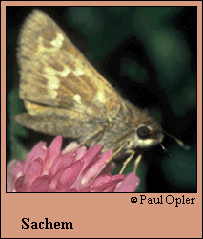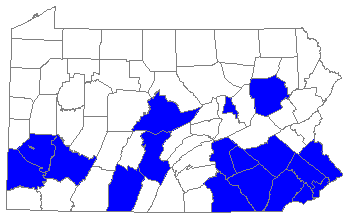 |
 

 |



Sachem (Atalopedes campestris [Boisduval])
Wing span: 1 1/4 - 1 5/8 inches (3.2 - 4.2 cm).
Identification: Upperside of male is yellow-orange with a wide brown border and a large squarish black stigma. Female upperside varies from yellow-brown to very dark brown, but always has a square transparent white spot at the end of the forewing cell. Underside of female hindwing is brown with nearly square cream or white spots.
Life history: Males perch on or near the ground during most of the day to wait for receptive females. Females lay single eggs on dry grass blades in the afternoon. Caterpillars feed on leaves and live at the base of grasses in shelters of rolled or tied leaves.
Flight: Three broods from May-November in the north; four to five broods from March-December in the Deep South.
Caterpillar hosts: Grasses including Bermuda grass (Cynodon dactylon), crabgrass (Digitaria), St. Augustine grass (Stenotaphrum secundatum), and goosegrass (Eleusine).
Adult food: Nectar from many flowers including swamp and common milkweeds, buttonbush, dogbane, peppermint, red clover, tickseed sunflower, thistles, New York ironweed, marigold, and asters.
Habitat: Disturbed, open areas such as roadsides, landfills, pastures, meadows, fencerows, yards, parks, and lawns.
Range: Southern United States from Virginia west to California; south through Mexico and Central America to Brazil. Strays and colonizes north to central North Dakota, southern Michigan, Manitoba, and northern Pennsylvania.
Conservation: Not usually required.
The Nature Conservancy Global Rank: G5 - Demonstrably secure globally, though it may be quite rare in parts of its range, especially at the periphery.
Management needs: None reported.
References:
Opler, P. A. and G. O. Krizek. 1984. Butterflies east of the Great Plains. Johns
Hopkins University Press, Baltimore. 294 pages, 54 color plates.
Opler, P. A. and V. Malikul. 1992. A field guide to eastern butterflies. Peterson
field guide #4. Houghton-Mifflin Co., Boston. 396 pages, 48 color plates.
Scott, J. A. 1986. The butterflies of North America. Stanford University Press,
Stanford, Calif. 583 pages, 64 color plates.
Tilden, J. W. 1986. A field guide to western butterflies. Houghton-Mifflin Co.,
Boston, Mass. 370 pages, 23 color plates.
Author: Jane M. Struttmann
State and Regional References:
Glassberg, J. 1993. Butterflies Through Binoculars: A Field Guide to
Butterflies in the Boston-New York-Washington Region. Oxford Univ. Press,
New York, N.Y. 160 pp.
Layberry, R.A., Hall, P.W. & Lafontaine, D.J., 1998. The Butterflies of
Canada. University of Toronto Press, Toronto, ON. 280 pp.
Opler, P.A. 1998. A field guide to eastern butterflies, revised format.
Houghton Mifflin Co., Boston.
Shapiro, A.M. 1966. Butterflies of the Delaware Valley. American Entomological
Society Special Publication. Philadelphia, PA. 79 pp.
Tietz, H.M. 1952. The Lepidoptera of Pennsylvania. The Pennsylvania State
College School of Agriculture Agricultural Experiment Station. State
College, PA. 194 pp.
Wright, D.M. 1995, Atlas of Pennsylvania Butterflies. Special Private
Publication, Lansdale, PA. 22 pp.

